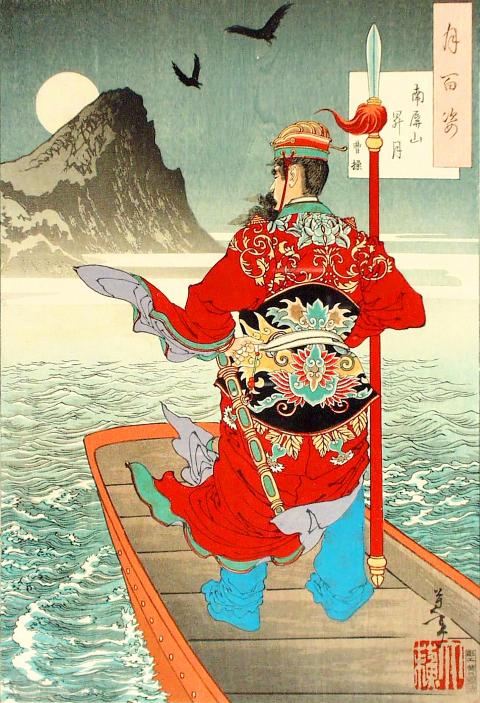Chinese practice
滄海一粟; 杯水車薪
(cang1 hai3 yi1 su4; bei1 shui3 che1 xin1)

Photo: Wikimedia Commons
照片:維基共享資源
a grain of millet in the vast ocean;
a cup of water on a burning cart of firewood
英文中有個片語「a drop in the ocean」(海裡的一滴水),意指行動或數量的微不足道。此語之出處見聖經欽定版英文譯本──以賽亞書第四十章第十五節說:「Behold, the nations are as a drop of a bucket, and are counted as the small dust of the balance: behold, he taketh up the isles as a very little thing.」(看哪,萬國都像水桶裡的一滴, 又被看作天平上的微塵;他舉起眾海島,好像極微之物。)換句話說,「a drop of a bucket」意指相較於整體而言,一個微不足道的量。
欽定版英譯聖經於一六一一年完成,雖然「a drop in the bucket」一語現仍通用,但後來由此演變出另一種說法「a drop in the ocean」(海裡的一滴水),其意義是相同的。此語第一次見諸書面或為一八○二年七月出版的《愛丁堡周刊》,顯然是在反對讓拿破崙(西元一七六九~一八二一年)得以成為終身獨裁者的公民投票:
「贊成拿破崙成為終身第一執政的票數,與法國總人口相比,就像是海洋中的一滴水。」
我們必須注意的是,中文成語「滄海一粟」(字面意為茫茫大海中的一粒米)雖看似與「a drop in the ocean」完全貼合,然而,「滄海一粟」比較是指在廣袤的宇宙和無盡的時間之流中,個人的無足輕重──它所表達的是傲慢的愚蠢和謙卑之必要,這和「a drop in the ocean」意指的行動或數量的微不足道,是不同的。
成語「滄海一粟」出自《前赤壁賦》(西元一○八二年),北宋詩人及政治家蘇軾(西元一○三七~一一○一年)在此文中,遙想西元二○八年赤壁之戰中龐大軍隊間的激烈衝突,想像這些戰船如何在揚子江中相接千里,數千旌旗飄揚遮住天空。蘇軾思忖偉大歷史人物的崛起和衰落、生命之短暫和我們的微不足道,無常是唯一確定的常態──蘇軾對同伴說道:「寄蜉蝣於天地,渺滄海之一粟。哀吾生之須臾,羨長江之無窮。」(我們就像蜉蝣遊蕩在世上,又像是漂流於滄海的一粒米,我們哀嘆自己的生命是多麼短暫,不由得羨慕長江的沒有窮盡。)
其實「杯水車薪」,才是意義更接近「a drop in the ocean」的成語(「杯水車薪」字面意義為一杯水、一車柴)。戰國時期儒家學者孟子在《孟子‧告子上》中,絕望地寫下了他所處時代的世態:「仁之勝不仁,猶水勝火。今之為仁者,猶以一杯水,救一車薪之火也;不熄,則謂之水不勝火,此又與於不仁之偶者也,亦終求亡而已矣。」(仁的力量很大,它可以像水消滅火一樣去消滅不仁的事。但是當今行仁的人並沒有真正全心全意去做,力量當然就小了。就好像只拿一杯水卻想要滅掉一車子薪柴所燒起來的火,怎麼可能辦得到?於是不但消滅不了不仁的事物,反而助長它們的氣燄,最後還會弄到自己被滅亡。)
成語「杯水車薪」便是由此段文字而來,意指力量太小,無濟於事。
(台北時報林俐凱譯)
有人認為,人活在世上只不過是滄海一粟,既渺小又短暫,沒甚麼好執著和計較的。
(Some believe that we live on this Earth for such a fleeting amount of time that there is no point being bullheaded or worrying about niggly things.)
這公司已經債台高築,所募得的零星款項如同杯水車薪,根本無濟於事。
(This company is drowning in debt; the funds they’ve raised are a drop in the ocean compared to what they need. It won’t be of much help.)
英文練習
A drop in the bucket/ ocean
There is a phrase in English that refers to the insignificance of an action or amount: A drop in the ocean. The origins of the phrase can be found in the King James Version of the English translation of the Bible. Isaiah 40:15 says, “Behold, the nations are as a drop of a bucket, and are counted as the small dust of the balance: Behold, he taketh up the isles as a very little thing.” In other words, an insignificant amount when measured against the whole.
The King James Version was completed in 1611. The phrase “a drop in the bucket” is still used, but “a drop in the ocean,” with the same meaning, evolved from this. Its first appearance in print seems to be in the July, 1802 edition of the Edinburgh Weekly Journal, in an apparent objection to the referendum then considered to essentially make Napoleon Bonaparte (1769 – 1821) dictator for life:
“The votes for the appointment of Bonaparte to be Chief Consul for life are like a drop in the ocean compared with the aggregate of the population of France.”
The Chinese idiom 滄海一粟 (literally, a grain of rice in the vast ocean) seems to be an exact match. It refers, however, more to one’s insignificance in the universe and the boundless sweep of time; it speaks of the folly of arrogance and of the need for humility.
The idiom derives from the Former Ode to the Red Cliff (1082), in which the Northern Song poet and statesman Su Shi (1037-1101) recalled the fierce clash between huge armies in the Battle of Red Cliff of 208 AD, imagining how the warships stretched bow to stern for over 1,000 miles along the Yangtze River, the skies obscured by the thousands of banners flying above them. Musing on the rise and fall of great historical figures, the brevity of life and our insignificance in it and how change was the only reliable constant, Su says to his companions 寄蜉蝣於天地,渺滄海之一粟。哀吾生之須臾,羨長江之無窮 (We are like mayflies wandering in the world, or a grain of millet drifting on a deep ocean. How short our span of life; how endless the Yangtze River).
Perhaps a closer alternative to “a drop in the ocean” is 杯水車薪 (literally “a cup of water; a cartload of firewood”). The ancient Chinese Warring States period Confucian scholar Mencius, in the gaozi I chapter of the mengzi, wrote despairingly about the state of affairs in his time: 仁之勝不仁也,猶水勝火。今之為仁者,猶以一杯水,救一車薪之火也;不熄,則謂之水不勝火,此又與於不仁之甚者也。亦終必亡而已矣 (Benevolence subdues non-benevolence as water subdues fire; people who practice benevolence today, however, do so as using a single cup of water to extinguish a burning cart of firewood; when the fire is not extinguished, they say that water is ineffective against fire, and this only goes to encourage those who are not benevolent).
From this extract we get the idiom 杯水車薪, referring to an amount wholly insufficient for the task it is supposed to perform.
(Paul Cooper, Taipei Times)
My contribution has been very small; a drop in the bucket compared to what you have achieved.
(跟你的成就相比,我的貢獻微不足道。)
The government does fund the arts, but it’s a drop in the ocean compared to what is needed.
(政府的確對藝術有所補助,但跟實際的需求相比,不過是杯水車薪。)

The Dutch introduced the Indian mango (Mangifera indica) to Taiwan in the 17th century. It is a green-skinned mango with thick fibers that get stuck in the teeth, but it boasts a rich aroma and a unique taste. In 1954, Taiwan’s Council of Agriculture introduced several mango cultivars from Florida, USA, including the Irwin, Haden, and Keitt varieties. After seven years of testing and domestication, the Irwin variety was chosen for promotion. Years later, the sample saplings started to bear fruit. These mangoes were large, with thin, vibrant red peels and golden pulp. The Irwin mangoes were mouth-wateringly sweet and

As the priest Antonius Hambroek stood in the dim chamber of Fort Zeelandia, his eldest daughter clung to him, her voice trembling. “Father, don’t go. They’ll kill you, and what will become of Mother and my sisters?” Outside, the sounds of Koxinga’s relentless canon siege boomed through the fortress. The defenders were on the brink of collapse. Starvation gnawed at their resolve, and the air carried the acrid stench of spent gunpowder and rotting flesh. Dutch reinforcements from Batavia had failed to arrive, leaving the garrison isolated and hopeless. Hambroek’s face was calm, though sorrow weighed heavily on his